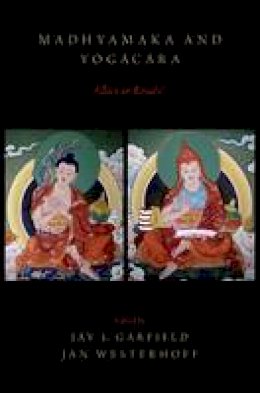
Stock image for illustration purposes only - book cover, edition or condition may vary.
Madhyamaka and Yogacara: Allies or Rivals?
Jay Garfield
€ 75.78
FREE Delivery in Ireland
Description for Madhyamaka and Yogacara: Allies or Rivals?
Paperback. Madhyamaka and Yogacara are the two principal schools of Mahayana Buddhist philosophy. While Madhyamaka asserts the ultimate emptiness and conventional reality of all phenomena, Yogacara is idealistic. This collection of essays addresses the degree to which these philosophical approaches are consistent or complementary. Editor(s): Garfield, Jay; Westerhoff, Jan. Num Pages: 304 pages. BIC Classification: HRAB; HRE. Category: (G) General (US: Trade). Dimension: 237 x 156 x 21. Weight in Grams: 404.
Madhyamaka and Yogacara are the two principal schools of Mahayana Buddhist philosophy. While Madhyamaka asserts the ultimate emptiness and conventional reality of all phenomena, Yogacara is idealistic. This collection of essays addresses the degree to which these philosophical approaches are consistent or complementary. Indian and Tibetan doxographies often take these two schools to be philosophical rivals. They are grounded in distinct bodies of sutra literature and adopt what appear to be very different positions regarding the analysis of emptiness and the status of mind. Madhyamaka-Yogacara polemics abound in Indian Buddhist literature, and Tibetan doxographies regard them as distinct systems. Nonetheless, scholars have tried to synthesize the two positions for centuries, as in the case of Indian Buddhist philosopher Santaraksita. This volume offers new essays by prominent experts on both these traditions, who address the question of the degree to which these philosophical approaches should be seen as rivals or as allies. In answering the question of whether Madhyamaka and Yogacara can be considered compatible, contributors engage with a broad range of canonical literature, and relate the texts to contemporary philosophical problems.
Product Details
Publisher
Oxford University Press Inc
Format
Paperback
Publication date
2015
Condition
New
Weight
403g
Number of Pages
304
Place of Publication
New York, United States
ISBN
9780190231293
SKU
V9780190231293
Shipping Time
Usually ships in 15 to 20 working days
Ref
99-3
About Jay Garfield
Jay L. Garfield is Kwan Im Thong Hood Cho Professor of Humanities and Head of Studies in Philosophy at Yale-NUS College, Professor of Philosophy at the National University of Singapore, Recurrent Visiting Professor of Philosophy at Yale University, Doris Silbert Professor in the Humanities and Professor of Philosophy at Smith College, Professor of Philosophy at Melbourne University and Adjunct Professor of Philosophy at the Central University of Tibetan Studies. Professor Garfield teaches and pursues research in the philosophy of mind, foundations of cognitive science, logic, philosophy of language, Buddhist philosophy, cross-cultural hermeneutics, theoretical and applied ethics and epistemology. Jan Westerhoff is a University Lecturer in Religious Ethics, University of Oxford, a Fellow and Tutor in Theology and Religion, Lady Margaret Hall, University of Oxford and a Research Associate, School of Oriental and African Studies, University of London. His research concentrates on systematic aspects of ancient Indian philosophy, especially on Madhyamaka.
Reviews for Madhyamaka and Yogacara: Allies or Rivals?
This is an important work on an issue that is surely amongst the most complex in Buddhist Studies. Garfield and Westerhoff have brought together eleven contributions whose mix of philology, history, and philosophical analysis advances our understanding significantly.
Tom Tillemans, Professor Emeritus, University of Lausanne
[The] authors collectively demonstrate that both Madhyamaka and Yogacara can be construed under myriad permutations of the two truths and the three natures, dissolving any possible monolithic characterization of either school, along with any coherent answer to whether they are allies or rivals.
Jed Forman, Reading Religion
Tom Tillemans, Professor Emeritus, University of Lausanne
[The] authors collectively demonstrate that both Madhyamaka and Yogacara can be construed under myriad permutations of the two truths and the three natures, dissolving any possible monolithic characterization of either school, along with any coherent answer to whether they are allies or rivals.
Jed Forman, Reading Religion
